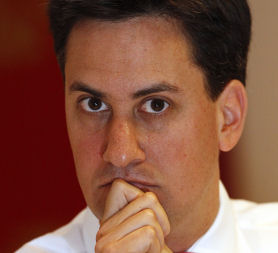Man Of The Hour? After five years of right-wing economic austerity, the British Labour Party leader, Ed Miliband, should be celebrating an historic landslide victory this morning – not casting his eyes, warily, north of the border.
UNLESS THE POLLSTERS have got it very wrong, it’s probably
too soon to say who has won the UK General Election. After five years of right-wing
economic austerity, that’s extraordinary. The British Labour Party should be
celebrating an historic landslide victory this morning – not casting their eyes,
warily, north of the border, to where the Scots really are celebrating an
historic electoral rout.
A great part of the problem afflicting labour and
social-democratic parties all over the western world is the vast gulf that now
separates the party activist from the party voter. Though many of Labour’s
activists may have grown up in families only one generation removed from the
mean streets of working-class existence, that gap is all important.
In the UK, the activist’s grandparents may have been among
the tens-of-thousands who gathered outside Transport House on 26 July 1945 to
celebrate Labour’s crushing victory over the old order, and to sing – no, not The Red Flag – but Jerusalem, the English poet, William Blake’s, great summons to
moral and spiritual transformation.
I will not cease from
mental fight
Nor shall my sword
sleep in my hand
Till we have built
Jerusalem
In England’s green and
pleasant land
That “Spirit of 45” was hot enough to keep up the pressure
in Labour’s political boilers for another quarter-century.
Victory! The British Labour Party leader, Clement Atlee, celebrates his own re-election and Labour's landslide victory on the night of 26 July 1945.
The wholesale democratisation of British society, which the
Spirit of 45 catalysed, made possible the next great wave of political
transformation. Building on the solid economic foundations of the Welfare
State, the post-war “Baby Boom” generation extended Labour’s revolution into
the fraught territory of race, gender and sexuality. These “new social issues”,
which also included the struggles against nuclear annihilation and
environmental desecration, recalled to the men and women of 45 the words of the
old trade union song, Bread and Roses:
Small art and love and
beauty their trudging spirits knew
Yes, it is bread we fight for, but we fight for roses, too
Yes, it is bread we fight for, but we fight for roses, too
The great hope, of course, was that, in the next generation
– the Baby Boomers children – this great, two-pronged assault on inequality and
injustice would culminate in a new kind of society: a society in which economic
and social democracy would finally be able to clothe the bare skeleton of
political democracy with living flesh and blood.
That this did not happen is explained, at least in part, by
the fact that the men and women of 1945 built too extensively and too well.
Full employment, strong trade unions and massive social housing programmes joined
with free public health and education to produce a generation for whom the
gut-wrenching realities of want, ignorance, idleness, squalor and disease had retreated
to the realm of parental memory. The power of collectivism, so essential to the
defeat of those evils, would also fade. Increasingly the question asked was not:
“What do we need?” But “What do I want?”
As the thirty-year period of reconstruction, which fuelled
the great post-war boom, fell victim to stagnation and the most successful
rear-guard action in defence of profit and privilege the world has ever seen, the
ideological separation of social from economic freedom saw the fire beneath
Labour’s boiler shrink to embers and ashes.
By the time Tony Blair’s “New” Labour Party confessed to
being “intensely relaxed about people becoming filthy rich”, it was clear that
the Spirit of 45 was dead. A Labour Party that no longer burns to create a
society in which none are filthy rich, and none obscenely poor, isn’t a “new”
Labour Party; it’s not a Labour Party at all.
Does Ed Miliband understand this? Does he now accept that
Labour, by upholding “economic freedom” as an unqualified good, has contributed
hugely to the burgeoning social inequalities against which he’s spent the last five
years campaigning? We must hope so.
We must also hope that in the ten minutes he spent chatting with
the visiting New Zealand Labour Leader, Andrew Little, he reiterated the
futility of promising to get tough on inequality, without also promising to get
tough on the causes of inequality.
That mental fight, in both the UK and New Zealand, remains
to be fought. A generation still waits for their bows of burning gold, their arrows
of desire; for their spears – oh clouds unfold! – for the chariots of fire that
only a real Labour Party can give them.
This essay was
originally published in The Waikato Times, The Taranaki Daily News, The
Timaru Herald, The Otago Daily Times and The Greymouth Star of Friday, 8 May 2015.


